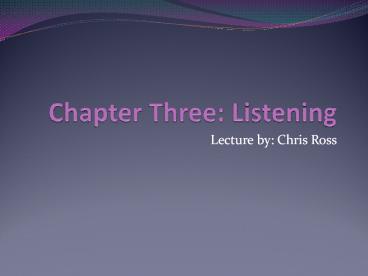Chapter Three: Listening PowerPoint PPT Presentation
Title: Chapter Three: Listening
1
Chapter Three Listening
- Lecture by Chris Ross
2
The Importance of Listening
- Most studies show listening to be the most
important communication skill in everyones
career - Employment interviews go better for those who
listen more carefully - Ideal management skill listening
3
Assumptions about Listening
- Faulty Assumption 1 Effective Communication is
the Senders Responsibility. - The burden of effective communication is both the
sender and receiver. - Faulty Assumption 2 Listening is Passive.
- Listening can be exhausting, ask a therapist!
- Faulty Assumption 3 Talking has More Advantages.
- You might say too much or you may get off task.
4
Assumptions about Listening
- Faulty Assumption 4 Listening is a Natural
Ability - Remember listening and hearing are not the same
thing.
5
Barriers to Effective Listening
- Environmental barriers
- Physiological barriers
- Psychological barriers
- Preoccupation
- Message overload
- Egocentrism
- Ethnocentrism
- Fear of appearing ignorant
6
Listening Styles
- Relational Listening gt those who are most
concerned with emotionally connecting with
others. - Analytical Listening gt those who are
interested/concerned about attending to the full
message before coming to judgment. - Task-Oriented Listening gt inclined/most
interested in getting the job done. Get to the
point! - Critical Listening gt desire to evaluate messages.
7
Whats Your Listening Style?
- Complete the self-assessment on page 67
8
Listening More Effectively
- Mindless Listening gt occurs when we react to
others messages automatically and routinely,
without much investment. - Mindful Listening gt giving careful and
thoughtful attention and responses to messages we
are given.
9
Listening More Effectively
- Listening to Understand
- Withhold judgment
- Talk and interrupt less
- Ask questions
- Paraphrase
- Attend to nonverbal cues
- Take notes
10
Listening More Effectively
- Listening to Evaluate
- Analyze the evidence
- Examine emotional appeals
11
Class Activity
- Develop a list of ways you could overcome the
greatest barriers that prevent you from listening
more effectively.
12
Class Activity
- In a group, use the listening styles below to
describe a specific work situation in which this
style would be effective and one situation in
which the style would probably not be
appropriate. Be able to defend your answers.

